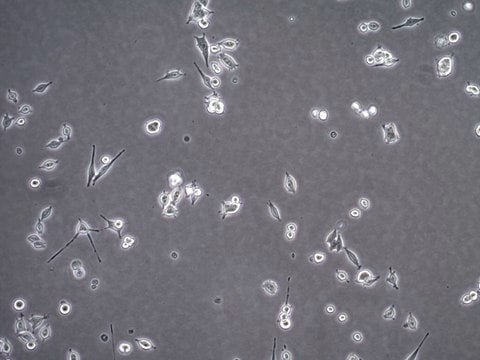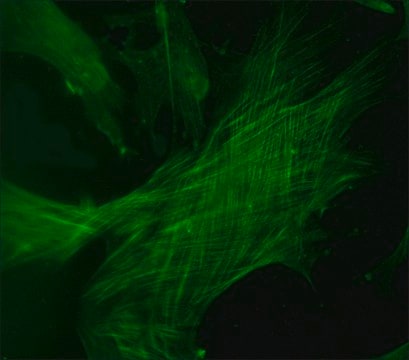SCCAR10064
Assay Ready LX-2 Human Hepatic Stellate Cell Line
Human
Synonyme(s) :
assay ready hepatic stellate cells, assay ready hepatocytes, hepatic fibrosis cell line, hepatic stellate cell line, hepatocyte cell line
About This Item
Produits recommandés
product name
Assay Ready LX-2 Human Hepatic Stellate Cell Line,
Source biologique
human
Niveau de qualité
Conditionnement
vial of 1 vial
Fabricant/nom de marque
Millipore
Technique(s)
cell culture | stem cell: suitable
Conditions d'expédition
liquid nitrogen
Température de stockage
−196°C
Description générale
LX-2 was generated by immmortalization of primary human hepatic stellate cells with the SV40 large T antigen followed by selective culture of early passaged cells in low serum media conditions.
Immortalized LX-2 was established by Xu et al to overcome issues of culture variability and to provide a stable and unlimited source of human hepatic stellate cells that are homogeneous. These cell lines have been extensively characterized and retain key features of cytokine signaling, neuronal gene expression, retinoid metabolism, and fibrogenesis, making them highly suitable for culture based studies of human hepatic fibrosis.
Caractéristiques et avantages
Description de la cible
Hepatic stellate cells are an essential cell phenotype responsible for liver fibrosis following their activation to fibrogenic myofibroblast-like cells in diseases such as chronic alcoholism, hepatitis B and C, fatty liver disease, obesity and diabetes. There is an increasing need for renewable cell culture models that faithfully recapitulate their in vivo phenotype, particularly for the development of therapeutics.
The LX-2 cell line was generated by immmortalization of primary human hepatic stellate cells with the SV40 large T antigen followed by selective culture of early-passage cells in low serum media conditions.
Stockage et stabilité
Autres remarques
Clause de non-responsabilité
Code de la classe de stockage
12 - Non Combustible Liquids
Classe de danger pour l'eau (WGK)
WGK 1
Point d'éclair (°F)
Not applicable
Point d'éclair (°C)
Not applicable
Certificats d'analyse (COA)
Recherchez un Certificats d'analyse (COA) en saisissant le numéro de lot du produit. Les numéros de lot figurent sur l'étiquette du produit après les mots "Lot" ou "Batch".
Déjà en possession de ce produit ?
Retrouvez la documentation relative aux produits que vous avez récemment achetés dans la Bibliothèque de documents.
Notre équipe de scientifiques dispose d'une expérience dans tous les secteurs de la recherche, notamment en sciences de la vie, science des matériaux, synthèse chimique, chromatographie, analyse et dans de nombreux autres domaines..
Contacter notre Service technique








